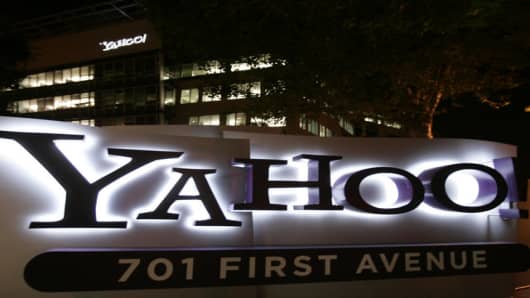Rupert Murdoch's News Corporation is in talks with Microsoft about joining in its contested bid for Yahoo, according to people involved in the discussions. The combination, which would join Yahoo, Microsoft’s MSN and News Corporation’s MySpace, would create a behemoth that would upend the Internet landscape.
Yahoo has resisted Microsoft’s overtures, contending that it will not negotiate unless Microsoft raises its offer.
Yahoo, which wants to remain independent, has been in a desperate search for white knights, holding conversations with Time Warner's AOL and News Corporation .
If News Corporation throws its weight behind Microsoft’s offer, that could allow Microsoft to raise its bid, putting even more pressure on Yahoo and its shareholders. At the same time, the alignment of Microsoft and News Corporation would remove a possible alternative for Yahoo, leaving it with fewer opportunities to escape Microsoft’s grasp.
The talks between Microsoft and News Corporation are at a sensitive stage, people involved in the discussions said. “There’s a long way to go before anything is definite,” one person involved in the talks said.
A Microsoft spokesman said he could not immediately comment. A spokesman for Yahoo declined to comment. A News Corporation spokesman said the company did not comment on “speculation.”
It is also possible that News Corporation could still participate in a deal with Yahoo on its own, though the disclosure of its talks with Microsoft may complicate that relationship.
Terms of the proposed union are still being worked out, these people said, and remain murky. News Corporation would probably contribute its Fox Interactive Media unit, which includes MySpace, and possibly cash to a partnership with Microsoft as part of an acquisition of Yahoo, they said.
The talks represent a change of sides for Mr. Murdoch. Just days after Microsoft made its bid, he flew to the West Coast and had dinner with Jerry Yang, Yahoo’s chief executive, offering his assistance in fending off Microsoft.
A deal between them would have involved joining forces with Google to use its lucrative advertising system on the companies’ sites. Antitrust concerns have, however, all but scuttled those talks, at least in that form.
On Wednesday, Yahoo suggested that it might be willing to cede part of its core business to Google, an archrival, to remain independent.
Yahoo said it would begin outsourcing a small portion of its search advertising to Google. The limited test is meant to determine whether the company could extract more revenue if Google ran its search advertising system. The test results might also back Yahoo’s contention that Microsoft’s offer undervalues the company, a person briefed on the plan said.
In the two-week test, Yahoo will use Google’s search advertising system to deliver ads that appear alongside Yahoo’s search results. The test will involve searches conducted in the United States on Yahoo.com, not on any of the company’s search affiliates, and will be limited to no more than 3 percent of all search queries, Yahoo said in a statement. Yahoo also said there was no guarantee that the test would lead to a broader deal.
Microsoft immediately blasted the idea of a search advertising partnership between Yahoo and Google, saying it would be anticompetitive. “Any definitive agreement between Yahoo and Google would consolidate over 90 percent of the search advertising market in Google’s hands,” Microsoft said in a statement.
In Washington, Senator Herb Kohl, a Wisconsin Democrat who is chairman of the Judiciary Committee’s Subcommittee on Antitrust, Competition Policy and Consumer Rights, also warned about the potential anticompetitive implications.
“We will be following closely the results of the short-term test alliance between Yahoo and Google,” Mr. Kohl said in a statement. He had previously raised concerns about a Microsoft-Yahoo combination.
Yahoo’s board is expected to meet this week to discuss its options.
For Yahoo, the idea of outsourcing its search advertising system to Google is not new. Investors and some executives inside the company have long recommended that it do so, as it could help the company increase revenue and cut costs.
Yahoo executives have resisted the outsourcing idea, saying that search and search advertising are essential pieces of the company’s business. Yet in a presentation to investors last month, Yahoo estimated that Google’s search advertising generated 60 percent to 70 percent more revenue on average than Yahoo’s.
Eric E. Schmidt, Google’s chief executive, also offered his assistance to Yahoo soon after Microsoft announced its offer. Executives from the two companies held talks to discuss, among other things, a search advertising partnership, but those talks cooled.
The talks appeared to have heated up again recently. Mr. Yang and Yahoo’s president, Susan Decker, visited Google in the last two weeks, said a person briefed on their visit.
In recent months, Yahoo has also been discussing a possible partnership with AOL, people involved in the talks said, but no deal is imminent. Such an agreement would not exclude a search advertising partnership with Google, these people said.
The advertising test may be a way for Yahoo to show Microsoft that it still has alternatives, said Carl W. Tobias, a law professor at the University of Richmond in Virginia. “But if this were to go forward as a full proposal, there would be some serious concerns in the antitrust area,” Professor Tobias said.
-- Saul Hansell contributed to this report.


